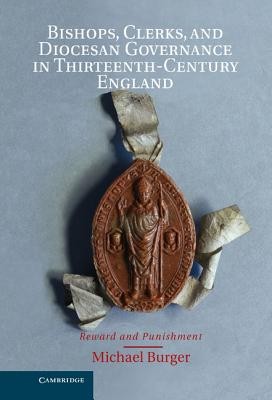
- We will send in 10–14 business days.
- Author: Michael Burger
- Publisher: Cambridge University Press
- ISBN-10: 1107022142
- ISBN-13: 9781107022140
- Format: 15.2 x 22.6 x 3.1 cm, hardcover
- Language: English
- SAVE -10% with code: EXTRA
Bishops, Clerks, and Diocesan Governance in Thirteenth-Century England (e-book) (used book) | bookbook.eu
Reviews
Description
This book investigates how bishops deployed reward and punishment to control their administrative subordinates in thirteenth-century England. Bishops had few effective avenues available to them for disciplining their clerks, and rarely pursued them, preferring to secure their service and loyalty through rewards. The chief reward was the benefice, often granted for life. Episcopal administrators' security of tenure in these benefices, however, made them free agents, allowing them to transfer from diocese to diocese or even leave administration altogether; they did not constitute a standing episcopal civil service. This tenuous bureaucratic relationship made the personal relationship between bishop and clerk more important. Ultimately, many bishops communicated in terms of friendship with their administrators, who responded with expressions of devotion. Michael Burger's study brings together ecclesiastical, social, legal, and cultural history, producing the first synoptic study of thirteenth-century English diocesan administration in decades. His research provides an ecclesiastical counterpoint to numerous studies of bastard feudalism in secular contexts.
EXTRA 10 % discount with code: EXTRA
The promotion ends in 16d.16:14:28
The discount code is valid when purchasing from 10 €. Discounts do not stack.
- Author: Michael Burger
- Publisher: Cambridge University Press
- ISBN-10: 1107022142
- ISBN-13: 9781107022140
- Format: 15.2 x 22.6 x 3.1 cm, hardcover
- Language: English English
This book investigates how bishops deployed reward and punishment to control their administrative subordinates in thirteenth-century England. Bishops had few effective avenues available to them for disciplining their clerks, and rarely pursued them, preferring to secure their service and loyalty through rewards. The chief reward was the benefice, often granted for life. Episcopal administrators' security of tenure in these benefices, however, made them free agents, allowing them to transfer from diocese to diocese or even leave administration altogether; they did not constitute a standing episcopal civil service. This tenuous bureaucratic relationship made the personal relationship between bishop and clerk more important. Ultimately, many bishops communicated in terms of friendship with their administrators, who responded with expressions of devotion. Michael Burger's study brings together ecclesiastical, social, legal, and cultural history, producing the first synoptic study of thirteenth-century English diocesan administration in decades. His research provides an ecclesiastical counterpoint to numerous studies of bastard feudalism in secular contexts.


Reviews